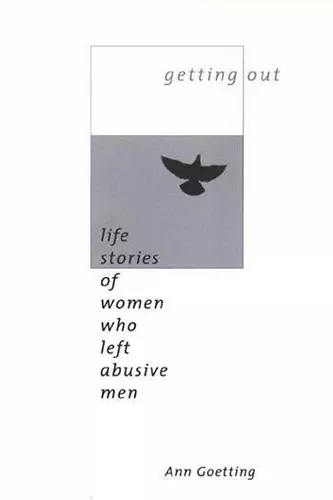Getting Out
Life Stories of Women Who Left Abusive Men
Format:Hardback
Publisher:Columbia University Press
Published:5th Oct '99
Currently unavailable, and unfortunately no date known when it will be back

The stories of the women in this book are a powerful wake up call for getting rid of society's stereotype of the abused woman. Here we see, once and for all, that we are all at risk, and that getting out is not as easy as everyone thinks. -- Marian Betancourt, author of What to Do When Love Turns Violent: A Practical Resource for Women in Abusive Relationships This collection of personal narratives gives powerful proof to the situations women encounter in abusive relationships. -- Lisa Weissenbuehler, PLA, "Outstanding" Rated Titles from University Press Books: Selected for Public and Secondary School Libraries Getting Out is at once personal and sociologically rich: it chronicles a great variety of women's struggles to gain freedom, yet it also reminds us eloquently of the still pernicious reality of women's battering. A great teaching tool. -- Sarah Fenstermaker, University of California, Santa Barbara These riveting stories, narrated by women who have made new lives for themselves after years of abuse, reveal the often lengthy and frustrating process they undertook of breaking the bonds of abuse wielded by their batterers. I strongly recommend that women seeking the insight, strength, and courage to leave abusive partners read this book, as should domestic violence experts, judges, attorneys, and caseworkers. -- Eileen King, editor of One Voice: The National Alliance for Abuse Awareness A fascinating and compassionate journey into the lives of women who 'get out'of violent relationships. It gives lasting meaning to the view that violence against women is a men's issue. We need more books like this! -- James W. Messerschmidt, author of Masculinities and Crime This collection of women's narratives uniquely and dramatically captures the wide range of ways that their abusive lovers ensnared them. By presenting each woman's entire story, Goetting enables the reader to sympathetically understand not only their terrible ordeals, but the enormous courage and support that enabled them to escape, though often at great price. -- Joan Zorza, editor of Domestic Violence Report
Each year, more than 2.5 million cases of battering are reported in the Unites States. This book describes how sixteen women got away for good. It recounts not only the stories of their abuse but also the women's life histories leading up to the battering and the resources they drew upon to escape. It helps women discover solutions to problems.Each year, more than 2.5 million cases of battering are reported in the Unites States, and as many as 2,000 incidents of abuse turn into murder cases. Every month, more than 50,000 women in the United States seek restraining or protection orders. While many books detail distinguishing characteristics of the abusive relationship, few accounts reveal how some women eventually gather the resources and courage to leave. In a chronicle by turns harrowing and inspiring, Ann Goetting tells how sixteen women finally got away for good. Getting Out recounts not only the stories of their abuse but also the women's life histories leading up to the battering-and the resources they drew upon to escape. Some of the women here received assistance from compassionate family members-Lee, for instance, secured support from her parents, who scheduled a holiday trip home for her to get her away from her husband, Tony, whose battering had reached life-threatening dimensions as he became progressively more involved with an outlaw motorcycle gang. Others were saved by a network of friends-Israeli-born Netiva married an American and escaped after a group of fellow graduate students helped break down the isolation that held her captive. As Goetting explains, leaving is a process rather than an event, often marked along the way by reconciliations and resumption of abuse. But as she and her informants suggest, the process invariably extends back to a critical moment when a decision to leave is made. The life-affirming moment may follow a particularly appalling episode of abuse or arrive in a long-repressed recognition of self-worth garnered from a positive experience at work or in the rearing of a child. Getting Out is a book that some women may read to discover solutions to problems within their own lives and those of people they know. It is also a work that social workers and psychologists who deal with battered women will find singularly informative, and one that will find an audience of readers seeking to understand the lives of women involved with abusive men.
Getting Out offers new insight into how women victimized in abusive relationships can successfully exit these tumultuous environments. Goetting presents qualitative data derived from interviews with several women who survived abusive relationships. As one reads these stories, there is no doubt that the author remains true to the integrity of these women's lives. She presents their highs and lows, their tragedies and victories, with attention to detail and a feminist lens through which to understand the context of each woman's experience...Goetting showcases the women's stories in a purposeful manner...Perhaps the most practical feature of this book is the ease with which it can be read. As with most qualitative research, the product feels like a novel based in truth. Students would most likely respond favorably to such a required reading. I would recommend this book as an addition to a monograph reading list for an upper-level course that focuses on violence in families and intimate relationships. Goetting has done a great service to the discipline by providing a window into these women's lives through which we can all learn a great deal.
ISBN: 9780231116480
Dimensions: unknown
Weight: unknown
288 pages